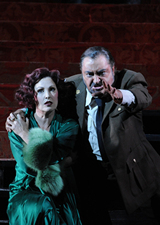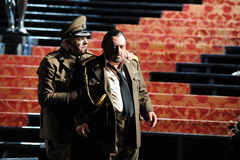| A memorable, moving experience by Sarah Noble | |
| Verdi: Otello Opera Australia Sydney Opera House 18 July 2008 | |
| Harry Kupfer's bold production further tightens the opera's focus. Kupfer abandons the comfortably distant trappings of Elizabethan theatre, setting the scene in wartime Europe, in a mansion belonging to a senior member of an all too familiar (though never explicitly identified) Fascist party. Hans Schavernoch's single set is a massive black staircase shot through by a cross of red and gold carpet, a bronze Atlas rises at the centre. This is grandeur on the verge of disintegration, however: an architectural reflection of the characters' internal state. The carpet is worn and there's a charred and gaping bomb crater at one side, determinedly ignored by all on stage. Against this implacable backdrop, the emotional turmoil which plays out is brought into sharp relief - despite the obvious historical connotations, it is the personal, not the political, which drives this Otello. A strong and experienced cast rises to the challenge. Welsh tenor Dennis O'Neill is impressive as Otello, singing with nobility and thrilling Italianate thrust. His powerful voice encompasses both the pathos and the fury of this hugely difficult role, and he meets its technical demands with idiomatic ease. O'Neill's acting extends little further than grimaces and gesticulation, but there's no doubting his commitment, and the authority of his vocal performance compensates his dramatic shortcomings. Cheryl Barker is a finely-wrought Desdemona. No mere adoring sweetheart, Barker's Desdemona has consciously founded her own identity upon the might of her powerful husband; abandoned by him, she finds herself completely bereft of any other means of emotional support. Barker sings with grace, precision and prismatic beauty, effortlessly conveying Desdemona's shifting state of mind. She's sweet and vivacious in early scenes, touchingly bewildered in the face of her husband's wild accusations and finally, in her Willow Song and Ave Maria, she's a picture of desolate loveliness, her soaring tone, gossamer pianissimi and vivid dramatic sense combining to heartrending effect. | |
|
Kanen Breen is brings attractive tone to Cassio, the unwitting centre of so much strife. After a worryingly muffled Elemer in Arabella, it's pleasing to hear Breen in such robust voice, although his preening stage presence make it hard to credit Cassio's promotion. Jacqueline Dark's Emilia resembles nothing so much as president of the local Women's Institute, but betrays real emotional depth in the opera's final moments and her rosy mezzo is a sumptuous, if fleeting, delight. Andrew Brunsdon is effective in his brief appearance as Roderigo, Shane Lowrencev dignified as the Venetian ambassador, and Andrew Moran's Herald another reminder of his very real promise. Verdi assigns a significant role to the chorus in Otello, and the Opera Australia chorus does an excellent job. It is they who open the opera, streaming down the stairs to Verdi's thunderous storm music, and they maintain that intensity throughout. It's a pity, though, that the uniformly strong singing on stage is not always matched in the pit. Simon Hewett - a protegé of Simone Young, who conducted the première of this production in 2003 - is effective in exploring the lush, radiant side of the score but a tendency to wallow means his reading can become hazy, robbing the opera of many of its striking orchestral colours. Even so, however, it's impossible deny the potency of Verdi's score. Brought to life by such a compelling cast of singers and fired by the genius of Harry Kupfer, it's a memorable, moving experience. | |
| Text © Sarah Noble Photos © Branco Gaica |
 Verdi's Otello is a rare bird. Arguably the composer's finest dramatic opera, it is also one of very few Shakespearean operas to do justice to the Bard. That's thanks partly to a composer as prodigiously gifted in his own field as Shakespeare was in his, and partly to Arrigo Boito's superbly concise adaptation, which removes much of the play's action and several of its characters while losing none of its impact. Stripped to bare essentials, Boito's libretto is a concentrated examination of the precarious personal relationships which are at the play's core. The score is one of Verdi's most extraordinary, his orchestral writing mingling clashing violence with swirling lyricism. Vocal lines are mostly fluid and naturalistic, eschewing the traditional recitative/aria structure, but incorporating several stunning set pieces.
Verdi's Otello is a rare bird. Arguably the composer's finest dramatic opera, it is also one of very few Shakespearean operas to do justice to the Bard. That's thanks partly to a composer as prodigiously gifted in his own field as Shakespeare was in his, and partly to Arrigo Boito's superbly concise adaptation, which removes much of the play's action and several of its characters while losing none of its impact. Stripped to bare essentials, Boito's libretto is a concentrated examination of the precarious personal relationships which are at the play's core. The score is one of Verdi's most extraordinary, his orchestral writing mingling clashing violence with swirling lyricism. Vocal lines are mostly fluid and naturalistic, eschewing the traditional recitative/aria structure, but incorporating several stunning set pieces.  Best of all is Jonathan Summers' diabolical Iago, a figure of inhuman - yet shockingly believable - evil and cruelty. Iago's presence is made all the more unsettling by his army uniform and jackboots; his "Credo in un dio crudel" is delivered with horrifying sincerity and shades of Nuremberg. Summers' slightly threadbare baritone is ideally suited to his purpose, and he manipulates it brilliantly - snarling one moment, smoothly persuasive the next.
Best of all is Jonathan Summers' diabolical Iago, a figure of inhuman - yet shockingly believable - evil and cruelty. Iago's presence is made all the more unsettling by his army uniform and jackboots; his "Credo in un dio crudel" is delivered with horrifying sincerity and shades of Nuremberg. Summers' slightly threadbare baritone is ideally suited to his purpose, and he manipulates it brilliantly - snarling one moment, smoothly persuasive the next.